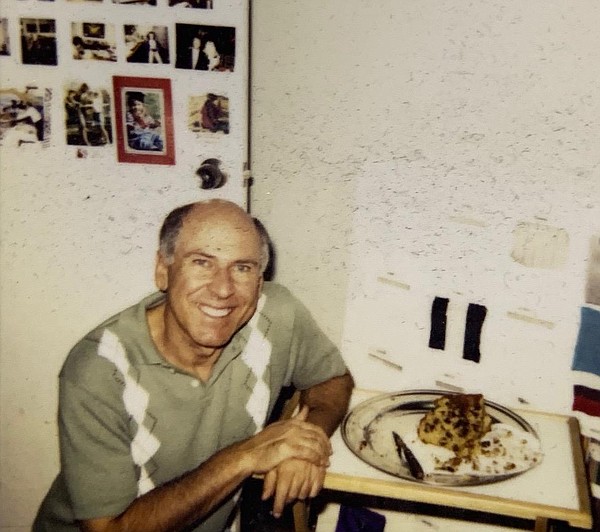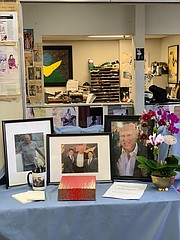OBITUARY
Rubin Schubert, 74: L.A. Textile King Passes Away Leaving a Legacy of Sustainable Sourcing
The old saying “legends never die” might be true, but the recent passing of downtown Los Angeles Ragfinders founder Rubin Schubert proves that legendary fashion personalities take a piece of all who know them when they leave.
Born on March 4, 1946, to Polish survivors of the Holocaust, Schubert passed away in Los Angeles on Aug. 5 from complications of an underlying illness unrelated to COVID-19. For Lonnie Kane, president and co-owner of the family-operated Karen Kane brand in Los Angeles, this ending of a more-than-40-year friendship and business partnership has been a personal loss.
“In his world of fabric, we go back so far. I cannot remember doing what I did with him with anyone else—it’s always been Rubin,” Kane said. “Didn’t matter what it was, he was always there. He was the first to donate, the first to give, the first to help—and with a smile. He had a great smile. He was just a delight.”
After moving to California from Brooklyn, New York, Schubert channeled his career as a textile representative during the 1970s into a new business model. Embarking upon a path as a textile reseller, Schubert offered vintage, dead-stock and surplus fabric from the trunk of his car, according to sales manager Sarah Torres, who has worked at the 44-year-old Ragfinders for eight years.
“Rubin was definitely one of a kind. He was an old-school Brooklyn New Yorker. We’ll miss his accent and quick wit. We have our minimums in place here, and some people aren’t a fan of that, but he taught me to know my worth and value,” Torres said. “We’re keeping his legacy alive. It will be owned by his nephew, Brian Schubert. Our warehouse manager, Josh Smith, and I will take over the office duties, buying fabric and invoicing.”
Known industrywide as the Brooklyn-born fabric expert with the tough exterior, Schubert was also the first person to lend a helping hand, never missing an opportunity to aid someone in need, often working with students from area fashion schools. The story of Schubert’s textile empire, which was built through a keen business acumen, unique personality and passion for the trade, was a testament to the possibility of building a successful company.
“His legacy was that you can do business very independently,” said California Fashion Association President Ilse Metchek. “We all have our niche in the world. We all have a place where we can more than survive—we can thrive at whatever niche we find. We can perfect it. He perfected a niche that no one else chose to follow. He had a niche business. He bought the building. He didn’t owe anyone anything, and he had a business that thrived.”
Reflecting on the beginning of the spread of COVID-19 across the United States, during which frontline workers encountered a shortage of personal protective equipment, Kane shared how he and his wife, Karen, wanted to make face coverings for their son-in-law, who is a doctor at Torrance Memorial Medical Center, and a niece, who is a doctor at Kaiser Permanente Los Angeles Medical Center.
“It was a certain type of cotton shirting we wanted to use,” Kane said. “I told him [Schubert] what I was doing and I wanted 500 yards. I asked him how much it would cost, and he asked me, ‘You’re giving this stuff away?’ and I told him yes, because they didn’t have anything. He told me he would donate it and I could have it. That was Rubin. You didn’t have to ask. He was the first to offer.”
Described by Torres as exhibiting the type of pride that shines through from a parent whose child advances into great achievements, Schubert exuded extraordinary joy upon discovering media stories covering his clients’ work. Evidence of his happiness could be found within Ragfinders, where newspaper and magazine clippings wallpapered the space, displaying the fruits of his customers’ determination and exemplifying the camaraderie Schubert felt with his clientele.
Former employee Conne Crebbin, who is now an independent mill representative, worked with Schubert for nine years beginning in 1998 and remained friends with him following her departure from the company. She reflected on the familial atmosphere among colleagues, including Marco Ramirez and brothers Tito and Tony Navarro, who have worked at Ragfinders for decades. She has received condolences and an outpouring of sympathy from Ragfinders clients near and far including Mexico, Hawaii and Thailand.
“He was a tough teacher, but I learned everything I know about textiles from him. He was my connector and catalyst for the close friends and business associates I have. He was amazing. Ragfinders was his world,” Crebbin said. “When he saw that he could trust you and you worked hard for him or you could have an exchange, he was so kind, so thoughtful and so generous. It was his family. “
While Schubert might be gone, Torres noted that those who loved him should keep in mind his passion for sustainable methods of garment making. It was the way he began his business as a pioneer in reselling unused fabrics, decades before the fringe hippie trend of environmental responsibility reached the mainstream.
“Sustainability was in his blood,” Torres said. “Not only with the dead-stock textiles we would sell, but he would also recycle every piece of paper in the office. I come from a background and love for sustainability in fashion and the fashion revolution, so carrying on his legacy of sustainability to the next generation of designers is what he would want to continue moving forward.”























